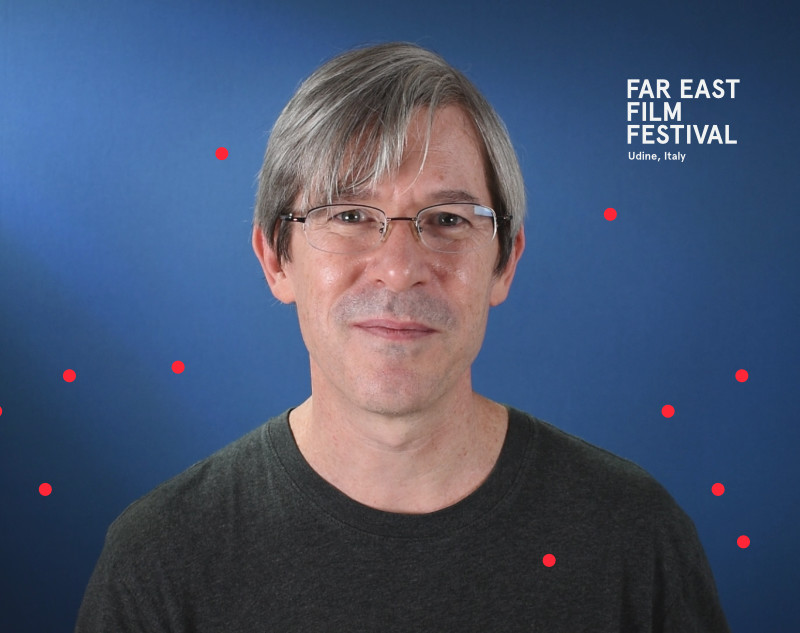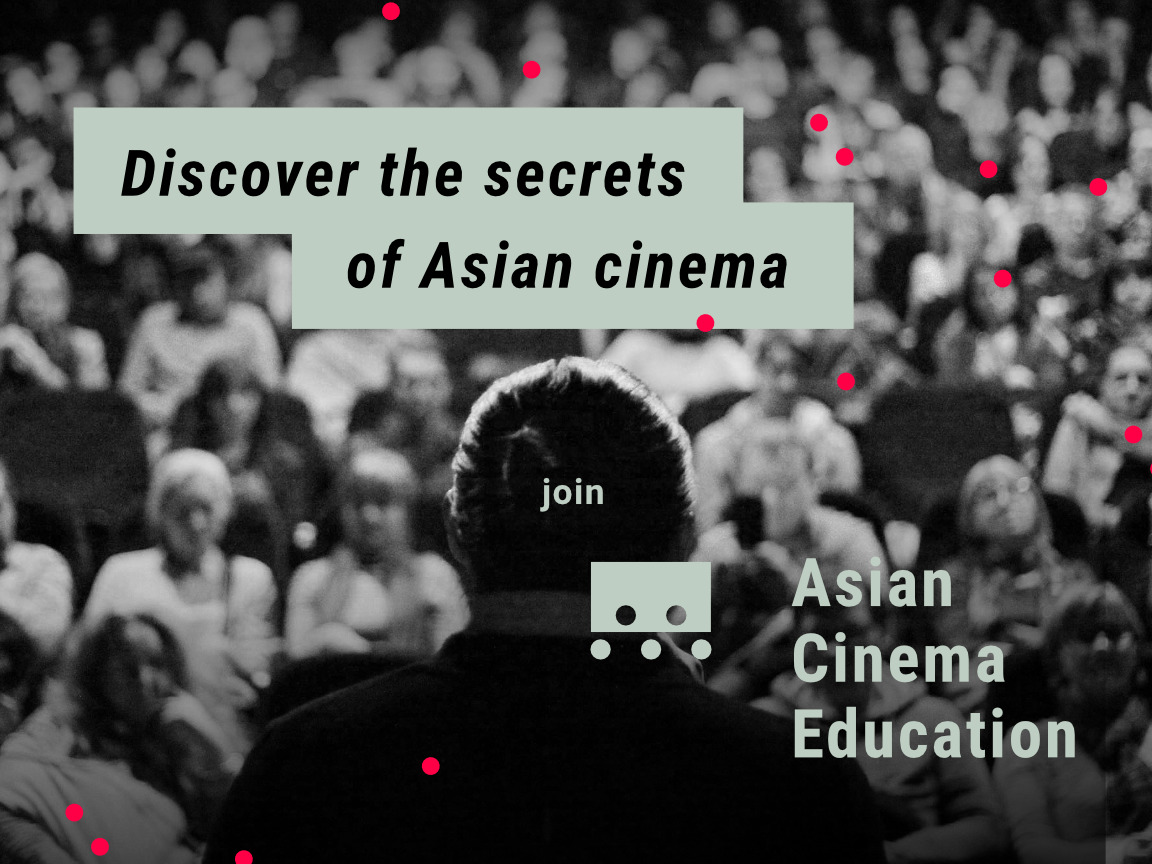Asian Cinema Education: wyjątkowy cykl wykładów już dostępny!
Asian Cinema Education to otwarty program edukacyjny, dzięki któremu każdy może poszerzyć swoją wiedzę o nowym kinie Azji. Chcesz wiedzieć więcej o reżyserkach z Hongkongu i Japonii? Interesują Cię źródła sukcesów nowego koreańskiego kina? Lubisz zgłębiać kulturowe tropy i odniesienia do tradycji w popkulturze? Zapraszamy!
Pierwsze cztery spotkania, poświęcone m.in. kinu Korei czy biografiom azjatyckich reżyserek, są dostępne od 5 maja. Kolejne tematy pojawiać się będą w dwutygodniowych odstępach, aż do 28 lipca.
Wykłady są ogólnodostępne i bezpłatne, udział nie wymaga rejestracji.
Asian Cinema Education to międzynarodowy projekt, powołany przez cztery festiwale specjalizujące się w azjatyckim kinie. Stoi za nim potrzeba dzielenia się wiedzą o współczesnych azjatyckich kinematografiach, ich fascynującym rozwoju i różnorodności - a także zachęta, aby uczyć się o nim pisać i opowiadać.
piecsmakow.pl/education
Program obejmuje cykl wykładów, z których pierwsze cztery można oglądać już teraz na stronie projektu. W kolejnych miesiącach będzie można wziąć udział również w interaktywnych kursach online poświęconych najważniejszym aspektom krytyki i dziennikarstwa filmowego, a także w rekrutacji do międzynarodowego People's Jury 15. edycji Pięciu Smaków.
Wykłady: Pewnego razu w Azji. Podróż przez kinematografie Azji Wschodniej i Południowo-Wschodniej

Oglądaj wykłady Asian Cinema Education
Szesnaście unikatowych międzynarodowych spotkań, poświęconych różnym aspektom azjatyckich kinematografii, to prawdziwa gratka dla miłośników sztuki filmowej. Zapraszają do zagłębienia się w niuanse azjatyckiego kina, będąc równocześnie zachętą do poznania jego społeczno-kulturowego tła, estetycznych tradycji, relacji między filmem a codziennym życiem i bieżącymi wydarzeniami w Azji. Cykl pozwoli dowiedzieć się, czym cechuje się styl reżyserski Park Chan-wooka, co straszy w japońskich horrorach i jak przedstawiano kobiece postaci w koreańskich filmach z lat 50-tych, ale też jak kino chińskie zmieniło Hollywood czy w jaki sposób "Park Jurajski" wpłynął na politykę finansowania sztuki filmowej w Korei Południowej.
Prowadzący to uznani wykładowcy, autorzy i osoby czynnie zaangażowane w promowanie azjatyckich kinematografii na świecie, a zarazem prawdziwi pasjonaci filmu, niestrudzeni w tropieniu intrygujących powiązań i zaskakujących kontekstów. Znalazły się wśród nich takie autorytety jak specjalista od kina koreańskiego Darcy Paquet, współpracująca z licznymi festiwalami badaczka Kiki Fung czy znawca japońskiej popkultury Tom Mes.
Pierwsze cztery spotkania, poświęcone m.in. kinu Korei czy biografiom azjatyckich reżyserek, są dostępne od 5 maja. Kolejne tematy pojawiać się będą w dwutygodniowych odstępach aż do 28 lipca.
Wykłady można oglądać z napisami w języku polskim, angielskim, niderlandzkim, włoskim i fińskim. Są ogólnodostępne, udział nie wymaga rejestracji.
Program cyklu wykładów

- Kluczowe momenty w historii kina Korei
Darcy Paquet [od 5 maja]
Wstęp do historii południowokoreańskiego kina: od jego początków w pierwszych dekadach XX wieku aż do połowy lat 90., okresu często uznawanego za początek współczesnego kina Korei. Wykładowca opisuje dramatyczne wydarzenia dwudziestowiecznej historii kraju i zarysowuje osiągnięcia filmowców w czasach politycznego chaosu, ostrej cenzury i ogromnego przewrotu społecznego.
- Nadszedł nasz czas: reżyserki współczesnego kina Azji
Jagoda Murczyńska [od 5 maja]
Krótki przewodnik po historii kina kobiet w Azji, prezentujący wybrane sylwetki autorek, które w znaczący sposób wpłynęły na kinematografię swoich krajów i spełniały się w wielu obszarach przemysłu filmowego. Wykładowczyni opowiada o mentorkach, takich jak Ann Hui i Marilou Diaz-Abaya, oraz o reżyserkach debiutujących w latach dwutysięcznych, które stały się częścią kobiecej fali we współczesnym światowym kinie.
- Chūshingura: 47 roninów. Od teatru lalkowego do Hollywood i AKB48 (ale czy na pewno?)
Luk van Haute [od 5 maja]
Legenda 47 roninów to jedna z najbardziej popularnych japońskich historii powracających w teatralnych, literackich i filmowych odsłonach. Skąd bierze się siła tej opowieści? Dlaczego zawarty w niej dylemat moralny wciąż budzi gorące emocje? Co łączy etyczne dylematy z początków XVIII wieku ze współczesną popkulturą?
- Nowe kino Korei
Darcy Paquet [od 5 maja]
Wykład skupia się na współczesnym renesansie koreańskiego filmu, nazywanym nowym kinem Korei. Tematy, które podejmuje, to między innymi: narodziny nowego kina Korei, czyli czynniki, które doprowadziły do nagłego rozkwitu koreańskiego przemysłu filmowego; gatunki w nowym kinie Korei, czyli to, w jaki sposób wyjątkowe podejście koreańskich twórców do kina gatunkowego pomogło stworzyć jego unikalną estetykę; oraz czterej najważniejsi reżyserzy, czyli sylwetki kluczowych koreańskich twórców: Park Chan-wooka, Lee Chang-donga, Honga Sang-soo i Bonga Joon-ho.
- V-cinema: japońska rewolucja wideo - Tom Mes [od 19 maja]
- Poetyka kina chińskojęzycznego - Kiki Fung [od 19 maja]
- Sukces chińskiego przemysłu filmowego w XXI wieku i jego wpływ na kino głównego nurtu - Marcin Krasnowolski [od 2 czerwca]
- Historia japońskiej produkcji filmowej - Eija Niskanen [od 2 czerwca]
- Jak bardzo japońskie jest anime? - Tom Mes [od 16 czerwca]
- Japońskie horrory i kino science fiction - Leena Eerolainen [od 16 czerwca]
- Teatr i taniec w kinie Azji - Anna Thuring [od 30 czerwca]
- Horror i chwała: pisanie i przepisywanie historii w kinie Japonii - Luk van Haute [od 30 czerwca]
- Kino Bhutanu - Jakub Królikowski [od 14 lipca]
- Kino Filipin - Roger Garcia [od 14 lipca]
- Współczesne kino Indii jako odbicie zachodzących zmian społecznych - Marcin Krasnowolski [od 28 lipca]
- Chiński przemysł filmowy: od piątej generacji do blockbusterów - Eija Niskanen, Jani Joenniemi [od 28 lipca]
Asian Cinema Education: dalsze plany
Kolejna odsłona projektu to Międzynarodowy Kurs Dziennikarstwa i Krytyki Filmowej Online - dostępne od września interaktywne szkolenie, skierowane do osób chcących przekuć swoją filmową pasję na działanie. Czterdzieści webinarów poświęconych będzie krytyce filmowej i umiejętnościom dziennikarskim - związanym zarówno z pisaniem długich i krótkich tekstów, jak i prowadzeniem podkastów, wywiadów z twórcami czy formom audiowizualnym. Ważnym elementem webinarów będą tematy związane z interpretacją filmów azjatyckich i historią dziennikarstwa związanego z kinem Azji.
Asian Cinema Education zaprasza również do wyjątkowej przygody: uczestnictwa w Międzynarodowym People’s Jury listopadowego Festiwalu Filmowego Pięć Smaków. Jury złożone będzie z dwunastu miłośników azjatyckiego kina z Polski, Włoch, Holandii i Finlandii. Podczas ośmiodniowego pobytu w Warszawie, jurorzy będą mogli poszerzyć swoje filmowe horyzonty, udoskonalić umiejętności pisarskie i redaktorskie, poznać różnorodne aspekty organizacji festiwalu filmowego i uczestniczyć w intensywnym życiu festiwalowym. Rekrutacja do People’s Jury rozpocznie się 1 września 2021.



